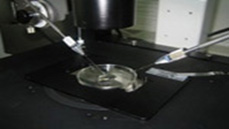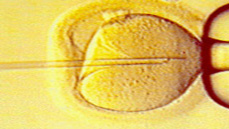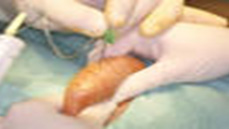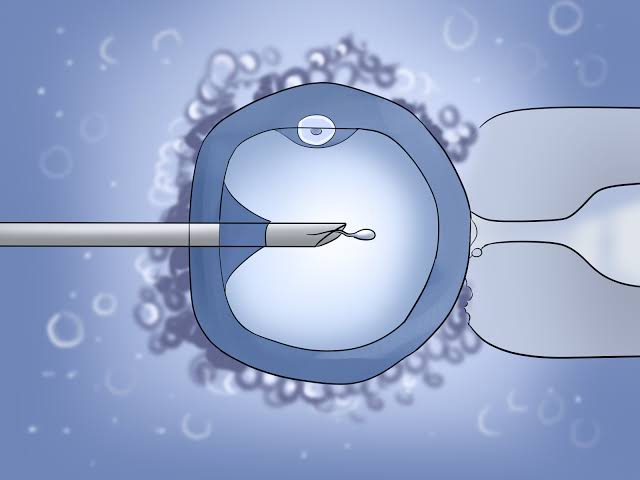The intracytoplasmic sperm injection (ICSI) treatment in vijayawada is yet another viable IVF treatment. It's used when the sperm quality of a man may be very low.
The woman’s eggs are extracted via puncture and then fixed beneath a designated microscope with the aid of a protecting pipette. One single sperm is injected in to every egg, making use of very fine micro-manipulation equipment. It is a very soft process performed by way of particularly expert Embryologist under a microscope.


The ICSI, also known as microinjection, done by best icsi specialist in Vijayawada copies the ordinary approach of a sperm's penetration of the egg cell. Utilizing this approach 50 - 70% of extracted eggs are fertilised. The embryo transfer happens after three to five days. It follows the same pre- treatment as in an IVF. The difference is that the sperm within the laboratory isn't combined with the egg cells, instead the sperm is injected into the egg.
This process overcomes many boundaries to fertilisation which can comprise failed fertilisation from repeated use of conventional IVF, extreme male factor infertility, very low sperm counts and/or motility(not up to 10 million sperm per millilitre), excessive quantity of morphologically irregular sperm, utilisation of surgically retrieved sperm, use of frozen sperm when confined in quantity and quality.
When the number of sperm is restricted (not up to 10 million sperm per millilitre) an previous attempt at fertilisation has been unsuccessful ("null fertilisation") when there are morphological irregular sperms: if the sperm's head doesn't have the correct form to enable it to penetrate and so fertilise the egg.
Utilisation of surgically retrieved sperm, When there's no sperm in the semen sample. Use of frozen sperm when limited to number and quality. The primary human pregnancy with best icsi treatment in Vijayawada was once done in 1992 and seeing that this time 1000s of babies were born consequently of the ICSI method, offering many couples with hope.
If the ejaculate does no longer contain any sperm or the sperm found are not suitable for egg fertilization. TESA is a process to extract sperm cells from the testicles, after a urologist has demonstrated that the possibilities of accumulating sperm in that method are considered. The method at icsi hospitals in Vijayawada is applied by means of andrologist below regional anesthesia. In TESA a small tissue pattern is picked up from the testicles via utilizing a skinny needle/ with the aid of a small cut on the testicular surface, and the sample is immediately examined in the laboratory. Sometimes a single sperm pattern isn't sufficient and sperm cells ought to be extracted from the opposite testicles as well whereas in MESA, the sample is amassed from the epididymal tissue. The gathered sperms are subsequently used in connection with ICSI for egg fertilization and /or frozen for future use.
There is a chance that no live sperm cells are determined that can be used. On this case, the probability of using donor sperm should be considered. Male Infertility Screening checks


IVM sometimes called a usual cycle or minimal stimulation, IVM sufferers bear a method whereby immature eggs are retrieved from the ovaries and matured within the laboratory in just one or two days. Eggs that reach maturity in the lab are then fertilized with sperm using the process of icsi treatment in Vijayawada. After the eggs are fertilized, the embryos are grown within the laboratory for two to 5 days earlier than being transferred to the mum’s womb.
IVM of human oocytes was once first validated in 1965 by using R. G. Edwards. The primary human start due to an oocyte matured in vitro occurred in 1991. In view that time, many modifications and refinements have been made to the process of IVM so as to fortify the efficiency and eventually the results of the manner. So far, there had been roughly 500 are living births worldwide hence of IVM.
Presently, there are three large patient categories for which IVM might represent a achievable replacement to typical hormonal stimulation of the ovaries and subsequent in vitro fertilization(IVF).
Women with polycystic ovarian syndrome,(PCOS), who're at tremendous risk of severe ovarian hyperstimulation syndrome(OHSS) – these females symbolize a population which tends to be exquisitely sensitive to the medicinal drugs required for ovarian stimulation in normal IVF protocols. Because IVM entails retrieving immature oocytes, little or no stimulation of the ovaries is required which nearly eliminates the risk of OHSS.
The other patient category which stands to benefit from IVM for motives acknowledged above is the women’s group who've gone through IVF earlier and developed ovarian hyperstimulationsyndrome(OHSS).
Ultimately, women who've obtained a cancer diagnoses and want fertility preservation prior to receiving chemotherapy are candidates for IVM. These patients could benefit from this technology as it could minimize the quantity of hormones to which they're exposed as good as shrink the amount of time essential between prognosis and the initiation of medication
Most of the time the IVM process requires minimal to no hormonal stimulation of the ovaries. An initial ultrasound at Infertility hospitals in Vijayawada is performed to determine if ovarian cysts are present earlier within the natural cycle of woman. A number of days later, ultrasound will likely be performed to determine follicular and endometrial development. Once a follicle reaches an correct dimension, the patient undergoes a surgery done by Infertility specialist in Vijayawada where the immature eggs are retrieved and matured in the laboratory in just one or two days.

The eggs are then fertilized with sperm utilising Intracytoplasmic Sperm Injection(ICSI) treatment in Vijayawada. After the eggs are fertilized, the embryos are grown in the laboratory for two to five days before being transferred to the womb of mother.
In 2009, the Cochrane Collaboration performed an exhaustive review of all recognized trials (released and unpublished) involving IVM in an effort to specifically compare are living birth outcomes from IVM to that of IVF.
The outcomes was once that there was no specific study recognized which was once deemed suitable to safely evaluate the two methods. Accordingly, information evaluating IVM success rates are restricted to prospective and retrospective observational reviews.
More commonly talking, in these observational reviews, maturation rates of retrieved immature oocytes are usually 60 – 70%, fertilization rates (frequently by ICSI) sixty five – seventy five%, implantation premiums round 10%. And clinical pregnancy rates 20 – 30%. Specific awareness must be made that due to the lower implantation rates related to IVM, most studies report replacing more embryos on average than is currently recommended by means of ASRM directions for patient age.
IVM technologies are evolving still and the process continues to be considered experimental. IVM appears to offer some clear advantages over normal IVF in some chosen patient populations. Nevertheless, before IVM turns into standard of care, persevered investigation is warranted in an effort to make certain safeguard and effectivity.
For the reason that IVM does now not require hormonal stimulation, this process requires fewer ultrasounds and blood experiment, however, when you consider that the IVM approach does require yet another two to three lab days. Patients will save the most via taking away medicinal drugs.
Cryopreservation is a process that has been developed for long term storage of cells and tissues and their subsequent use.
It's feasible to cryopreserve embryos, oocytes(eggs), semen and ovarian or testicular tissue in liquid nitrogen at Fertility clinics in Vijayawada. There are two methods of freezing that can be utilized with slower programmable freezing and flash-freezing method known as Vitrification.
Embryo freezing: slow freezing shouldn't be getting used now
Spare embryos or eggs of fine quality may also be frozen and stored for future use by Best Infertility doctors in Vijaywada. In case of failed IVF method within the first cycle, these preserved eggs present a second opportunity of success without the need for ovarian stimulation and egg collection. The freeze procedure we use is called vitrification.
Vitrification : is the technique that has transformed the face of cryopreservation
Vitrification is an ultra speedy embryo freezing technique. Vitrification is a method of converting anything into glass like solid free of any crystal formation. Like for blastocyst, by adding cryoprotectant, water will also be cooled unless it hardens like glass with no formation of ice crystals.
Infertility hospitals in Vijayawada have been utilising vitrification for a number of years and consider it as a superior method of freezing with our own results showing huge upgrades in results of pregnancy.